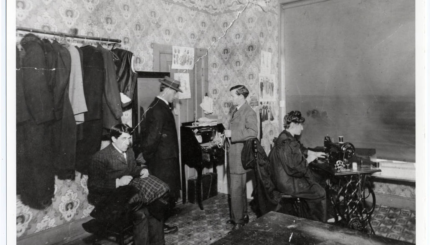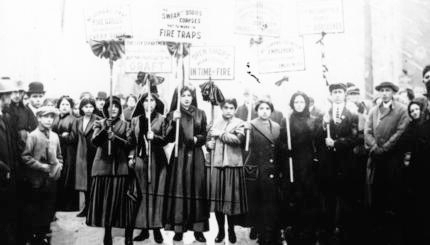Virtually everyone, at some point in his or her life, is an employee or an employer, and almost everyone has experienced both healthy and unhealthy work environments. Because the work we do influences our identities, social relations, and financial status, what happens in the workplace reverberates far beyond the office.
Our communal identity, too, reflects our experience as workers. The central narrative of the Jewish people involves our liberation from slavery, perhaps the worst imaginable work environment. Similarly, we cannot tell the story of Jews in America without mentioning the immigrant workers who suffered at the hands of sweatshop bosses and who created the first unions.
Given the centrality of work throughout Jewish history, it is no wonder that Jewish law expends significant energy on defining a set of labor laws designed to create a balanced relationship between employers and employees. Within these laws, each party has obligations toward the other and expectations of the other. Thus, employers are forbidden from delaying payment to workers, and employees are required to work diligently and not to steal employers’ time.
Obligations on Employers
While making certain demands on workers, the bulk of Jewish labor law imposes obligations on employers. This emphasis on the responsibilities of employers reflects an understanding of the essential power imbalance between employers and employees, as well as an internalization of the Exodus narrative. Often cited within discussions of labor law is the biblical verse, “they are my servants” (Leviticus 25:43), understood by the rabbis to imply “and not servants to servants.” The experience of slavery and redemption instills within the lawmakers a wariness about any situation in which one person might, de facto, become the servant of another.
With your help, My Jewish Learning can provide endless opportunities for learning, connection and discovery.
The central biblical text on the obligation of employers emphasizes the poverty of workers:
Do not oppress the hired laborer who is poor and needy, whether he is one of your people or one of the sojourners in your land within your gates. Give him his wages in the daytime, and do not let the sun set on them, for he is poor, and his life depends on them, lest he cry out to God about you, for this will be counted as a sin for you.” (Deuteronomy 24:14-15)
This text assumes a situation in which workers are hired and paid by the day. In our contemporary context, this may be compared to people paid by the hour — that is, people paid according to the time worked, and not according to the job completed.
Two Kinds of Workers
Jewish law differentiates between two categories of workers: the po’el, the type of worker described above, who is paid by the hour or by the day; and the kablan, a contractor paid for finishing a specific project. The kablan is generally described as a skilled worker, such as a carpenter, a repair person or an artisan. This person is less dependent on day-to-day wages than a poel and has greater leverage with the employer. A kablan whose employer refuses to pay, or pays too little can simply hold on to the item s/he has been hired to make or fix. Therefore, most of the laws protecting workers focus on the category of the poel, who is at the mercy of the employer.
The Talmud, discussing the biblical prohibition against delaying the payment of workers, comments:
Why does he climb a ladder or hang from a tree or risk death? Is it not for his wages? Another interpretation–‘His life depends on them’ indicates that anyone who denies a hired laborer his wages, it is as though he takes his life from him. (b. Bava Metzia 112a)
The Talmud calls to our attention the extent to which low-wage workers are dependent on their earnings. The lowest-wage workers, the Talmud reminds us, perform the most dangerous and undesirable jobs and are the most likely to starve or otherwise suffer if denied pay.
The understanding of the essential inequality between employers and low-wage employees prompts the rabbis to place additional obligations on the employers and to increase the privileges of the employees. Employees are permitted to eat from the crop they are harvesting, and may quit work in the middle of the day, as long as doing so does not cause irreversible damage to the employer.
In a case, for instance, in which the crop will be lost if not harvested that day and no other workers are available, a worker may not leave in the middle of the day without paying a fine. In other cases, however, the rabbis permit the worker to quit, again invoking the principle that we are servants to God and not “servants to servants.” (Bava Metzia 86b)
If outside factors prevent a worker from completing the assigned task — for instance, if a rainstorm interrupts the harvest, or a sick person whom one has been hired to help dies — the worker, in most cases is compensated for the entire day. This worker, the rabbis understood, is counting on his salary for the day, and would not have accepted the job if not for the promise of a certain wage.
In one case, the Tosefta (a rabbinic work from around the second century that parallels and supplements the Mishnah) mandates that a rabbi must pay a worker in full, even after this worker breaks a jug he was hired to carry. There, the text refers to the biblical verse, “Follow the way of the good and keep the paths of the just” (Proverbs 2:20). Even though, the Tosefta implies, the letter of the law may not require payment, the spirit of the law obligates the employer to take care of the worker, who depends on his wages for survival.
While generally allowing “the custom of the place” to set workers’ wages and hours, Jewish law permits the workers to organize amongst themselves and to agree to standard prices. In medieval times, such law led to the establishment of workers’ guilds in many Jewish communities. In contemporary times, many legal authorities, including Rabbis Moshe Feinstein and Eliezer Waldenburg (two 20th-century Orthodox authorities in Jewish law), have used early sources on workers’ autonomy to justify unions and strikes. According to Feinstein, “in the case in which workers decide that they will not work until they receive a raise in salary or a similar thing. .. the majority may force the minority to observe it.” (Iggrot Moshe, Hoshen Mishpat 59)
Workers’ Responsibilities
While employees have obligations to workers, workers also have responsibilities to their employers. The obligations for prayer and for reciting Birkat HaMazon [the blessing after eating a meal] are lessened for workers, in order to minimize the time spent away from work. Workers are expected to be diligent in their tasks and not to waste time during the day.
The laws governing the relationship between employers and employees aim to create a balanced working situation, in which each party receives what she or he needs. As the employers necessarily enter the partnership with greater power, Jewish law spends more time defining the obligations of the employer, rather than the employee. The Jewish historical narrative is too explicit about the pain and dangers of slavery for Jewish law to recreate such a situation.
Talmud
Pronounced: TALL-mud, Origin: Hebrew, the set of teachings and commentaries on the Torah that form the basis for Jewish law. Comprised of the Mishnah and the Gemara, it contains the opinions of thousands of rabbis from different periods in Jewish history.
Birkat Hamazon
Pronounced: beer-KAHT hah-mah-ZONE, Origin: Hebrew, Grace After Meals, the blessing thanking God for the food.



